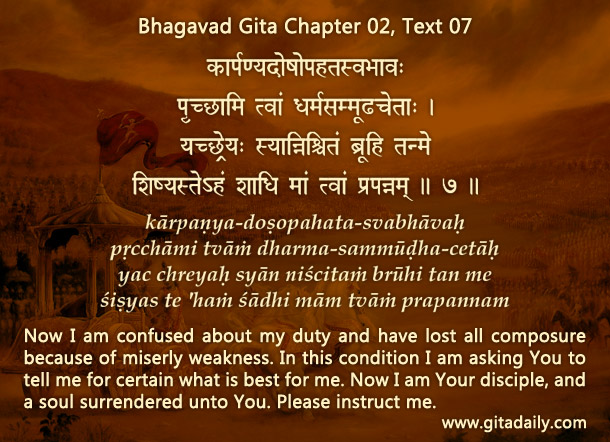Seek first to understand the question to best understand the answer
Suppose we hear a discussion between a teacher and a student. If that discussion had started because of a specific question from the student, then understanding that question would make the discussion clearer – especially if the discussion were deep, technical and wide-ranging.
Such is the content of the Bhagavad-gita. It addresses many profound life-truths, many life-purposes for people at different spiritual levels and many life-paths for furthering our spiritual evolution. Moreover, it was spoken thousands of years ago when the prevailing worldview was significantly different. That’s why if we dive headlong into the Gita, we may find its intricacies overwhelming.
Making matters worse, many people take an intellectual shortcut: they overlook the Gita’s complex content and look only at its context: As it was spoken on a battlefield and its student fought a war after hearing it, they presume that it must be a violence-instigating text. They conveniently overlook that millions have followed the Gita for millennia without using it to justify violence.
Given such potential pitfalls, how can we make sense of the Gita? By looking at its driving question. The Gita is essentially Krishna’s answer to Arjuna’s question: what is dharma? (02.07). Dharma refers not to some sectarian religious ritual, but to the universal path of harmony. It connotes the right course of action – the action that will bring us in harmony with our essential nature and the world’s essential nature. On hearing the Gita, Arjuna harmonized himself with divine will (18.73).
The central question of duty and destiny – of what we are meant to do – is eternally relevant. Seeking its answer has stimulated thinkers since time immemorial, and it has illuminated the Gita’s countless readers.
When studying the Gita, if we focus on this universal question, we will find the Gita easier to both assimilate and apply.
Think it over:
- Why do many Gita readers find it overwhelming?
- Why do some Gita readers think that it instigates violence?
- What is the Gita’s driving question? How is that question universally relevant?
To know more about this verse, please click on the image
Explanation of article:
Podcast:


GITA is the sonnet of LIFE